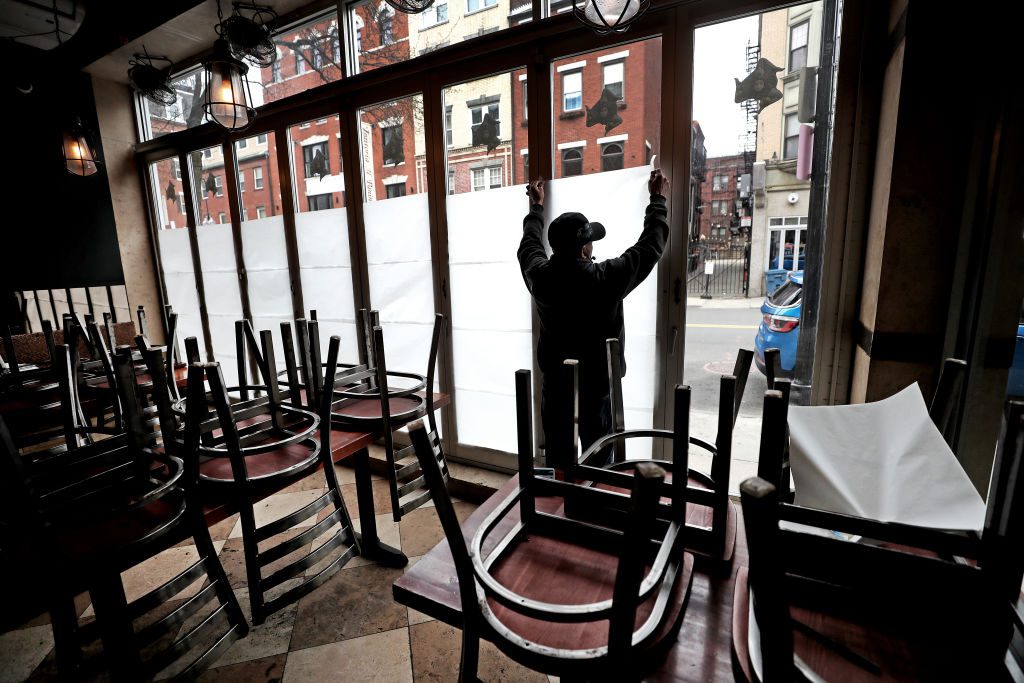The Coming Dark Age for Restaurants

The latest retail numbers are in and they are brutal. Total retail sales for March plummeted by 8.7 percent. And that’s bearing in mind that most stores didn’t close until partway through the month, meaning the data for April is likely to be far worse. The retail category includes bars and restaurants, so no surprise that, according to the National Restaurant Association (the nicer NRA), eating and drinking establishments lost a net 417,000 jobs last month. That’s more than six times the previous record decrease of 67,000 jobs back in 2000.
Over at The Week, Bonnie Kristian wonders just how permanent this damage will be. She notes that before Prohibition, bars and breweries had proliferated across the United States. Yet by banning alcohol, the government touched off a trend of closures and consolidations that continued long after booze was permitted again. It took 80 years, Kristian notes, for America’s once-thriving suds sector to recover, with my generation the first to come of drinking age amid the kind of brewing creativity that prevailed before Wayne Wheeler got to work.
Now Kristian worries the coronavirus quarantines could usher in something similar for restaurants. She writes:
Chain restaurants are more likely to survive, but what are chains like Applebee’s if not the Natty Light of the restaurant world? They’re hardly repositories of culinary wisdom. Applebee’s and its peers also aren’t what sustains supply chains of unusual, often locally-sourced ingredients integral to more innovative establishments — supply chains now being thrown into chaos. Nor are chains employing ingenious chefs who could leave the country for stronger restaurant markets or quit cooking altogether.
If chain restaurants are all we have left after the pandemic, our food scene will be as bland and boring as mid-century American beer. Even if the economy is otherwise back to normal in two or five or 10 years, the diversity and creativity of our local restaurants could be diminished for decades longer. We must find a way to heed the warning Prohibition history blares.
The risk here is that we’re entering a culinary dark age (one imagines monks recording slider recipes for posterity). And again, it really is difficult to understate just how on fire the restaurant industry is right now. One estimate suggests that 75 percent of independently owned eateries closed because of the coronavirus will shut down for good. The NRA, meanwhile, projects that job losses at restaurants and bars this month will number in the millions, something never before seen in the postwar era.
How might the quarantines shift our mealtime thinking? What if they do to the restaurant what telecommuting has done to the office and Netflix has done to the movie theater? What if cooking becomes just another democratized and DIY endeavor, something we all have just enough knowledge to do just well enough, negating the need for the professionals? All of that is possible, but it seems unlikely. Human sociability is what it is, and after this crisis is over, we’re all going to be nothing if not tired of our own kitchens and living rooms. And if we’re venturing into the office less frequently than we were before, that’s only going to make us want to go out more in the evening.
Hopefully, then, this won’t be nearly as bad as Prohibition. Man can live without a stiff drink (though goodness knows why he’d want to), whereas a meal is a more essential thing, militating in our restaurants’ favor. Also restaurant sales aren’t currently banned the way alcohol was in the 1920s, and local establishments are finding ways to adapt. Curbside service, delivery options, and sidewalk markets might just be bandages on the bleeding, but they can keep at least a little revenue trickling in. And loans in the stimulus package recently passed by Congress can help too.
I think the most likely outcome is, as Kristian says, a wave of consolidation that sees plenty of charming local joints stay open but favors the mediocre TGI Fridays of the world. That would truly be a shame, as restaurants are the backbone of American small business: nine in 10 have fewer than 50 employees and seven in 10 are single-unit operations. And what of other countries? Occasional TAC contributor Lara Prendergast noted in a New York Times piece back in 2018 that Britain was only just developing the kind of robust restaurant scene that America has long enjoyed, shedding its bleak reputation for porridge and canned vegetables. Surely a more fragile culinary landscape will only be at greater risk of closures and consolidations.
It’s an interesting question amid so many others right now. What if, after the pandemic is through, our nightlife is just a little more boring than it was before?
Comments